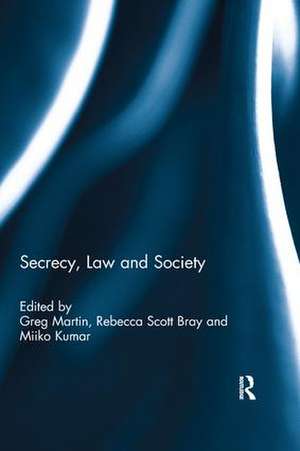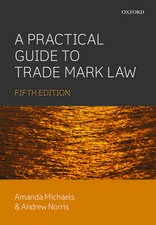Secrecy, Law and Society
Editat de Greg Martin, Rebecca Scott Bray, Miiko Kumaren Limba Engleză Paperback – 20 dec 2016
In law, secrecy has implications for the separation of powers, due process, and the rule of law, raising fundamental concerns about open justice, procedural fairness and human rights. Beyond the counterterrorism and legal context, scholarly interest in secrecy has been concerned with the credibility of public and private institutions, as well as the legacies of secrecy across a range of institutional and cultural settings.
By exploring the intersections between secrecy, law and society, this volume is a timely and critical intervention in secrecy debates traversing various fields of legal and social inquiry. It will be a useful resource for academic researchers, university teachers and students, as well as law practitioners and policymakers interested in the legal and socio-legal dimensions of secrecy.
| Toate formatele și edițiile | Preț | Express |
|---|---|---|
| Paperback (1) | 472.62 lei 6-8 săpt. | |
| Taylor & Francis – 20 dec 2016 | 472.62 lei 6-8 săpt. | |
| Hardback (1) | 1057.89 lei 6-8 săpt. | |
| Taylor & Francis – 2 iun 2015 | 1057.89 lei 6-8 săpt. |
Preț: 472.62 lei
Nou
Puncte Express: 709
Preț estimativ în valută:
90.43€ • 94.42$ • 74.85£
90.43€ • 94.42$ • 74.85£
Carte tipărită la comandă
Livrare economică 05-19 aprilie
Preluare comenzi: 021 569.72.76
Specificații
ISBN-13: 9780415792257
ISBN-10: 0415792258
Pagini: 288
Dimensiuni: 156 x 234 x 15 mm
Greutate: 0.53 kg
Ediția:1
Editura: Taylor & Francis
Colecția Routledge
Locul publicării:Oxford, United Kingdom
ISBN-10: 0415792258
Pagini: 288
Dimensiuni: 156 x 234 x 15 mm
Greutate: 0.53 kg
Ediția:1
Editura: Taylor & Francis
Colecția Routledge
Locul publicării:Oxford, United Kingdom
Public țintă
Postgraduate and UndergraduateCuprins
1. Secrecy, Law and Society, Miiko Kumar, Greg Martin, Rebecca Scott Bray PART 1: SECRECY AND SECURITY 2. Living with National Security Disputes in Court Processes in England and Wales, Clive Walker 3. Secrecy Law and its Problems in the United States, Thomas C. Ellington 4. Balancing Away Article 6 in Home Office v Tariq: Fair Trial Rights in Closed Material Proceedings, Ryan Goss PART 2: OPEN JUSTICE AND PROCEDURAL FAIRNESS 5. Protecting Procedural Fairness and Criminal Intelligence: Is There a Balance to be Struck?, Gabrielle Appleby 6. Is There a Requirement for Fair Hearings in British and Australian Courts?, Steven Churches 7. Secrecy, Procedural Fairness and State Courts, Rebecca Ananian-Welsh PART 3: RIGHT TO KNOW 8. Secrecy, the Media and the State: Controlling and Managing Information about Terrorism and Security, Lawrence McNamara 9. Secret Material and Anti-terrorism Review in Australia and Canada, Jessie Blackbourn 10. Secret Policing: Boundaries of Undercover Evidence, Miiko Kumar 11. Anonymity and Defamation, David Rolph PART 4: SECRECY AND SOCIETY 12. Strategy for Public Interest Leaking, Brian Martin 13. Open Secrets, Open Justice, Katherine Biber 14. Secret Isle? Making Sense of the Jersey Child Abuse Scandal, Greg Martin and Rebecca Scott Bray
Recenzii
"Lawyers, scholars and most certainly journalists and feature writers doing research in any of these areas will find this book, with its extensive and meticulous footnoting, a treasure trove of references to follow up as interesting and authoritative avenues for further enquiry. What is especially refreshing about the book is its plain-speaking and quite often hard-hitting approach to the various aspects of this topic about which the individual contributors have strong views. As a contribution to the ongoing debate on the often insoluble problems inherent in issues of secrecy, security, free speech and the law, this book with its diversity of opinion is first class." - Phillip Taylor MBE, Richmond Green Chambers
Descriere
The ‘culture of security’ ushered in after 11 September 2001 has involved exceptional legal measures and – as exemplified by the Chelsea Manning and Edward Snowden leaks – increased recourse to secrecy on the basis of protecting public safety and national security. Beyond this counterterrorism and national security context, however, secrecy has emerged as a key issue in a range of other institutional and cultural settings; impacting upon a range of legal issues, including, the separation of powers, due process, procedural fairness and human rights. And, more broadly, questions concerning secrecy touch on the credibility of both public and private institutions. Accordingly, this edited collection constitutes both a timely and critical intervention into secrecy debates, as they stretch across the various fields of law, politics and social inquiry.










